Sierra AI vs. the competition: 4 best Sierra alternatives in 2025

Stevia Putri
Last edited September 21, 2025

There's a lot of buzz around Sierra, and for good reason. With big names behind it and a sky-high valuation, it’s definitely turning heads in the conversational AI world. But when teams actually look into using it, they often run into a few snags. It’s a new platform, the pricing isn’t clear, and you have to build everything from the ground up, which can be a real roadblock.
Here’s the thing: most support teams aren’t looking to tear down their entire setup and start from scratch. They need AI tools that can boost the helpdesks and knowledge bases they already depend on, not replace them. The good news is, there are plenty of mature, flexible, and affordable Sierra alternatives out there.
In this article, we'll give you a straightforward comparison of the top four. We’ll look at how well they connect with your existing tools, how easy they are to get started with, and the real value they offer.
What are conversational AI platforms? A look at Sierra alternatives
Simply put, conversational AI platforms are tools that use artificial intelligence to handle customer chats, emails, and internal messages. Think of them as a smart engine for everything from a basic website chatbot to an advanced AI agent that can solve tricky customer problems on its own.
The main goal is to give customers instant answers, reduce the repetitive tasks that bog down support agents, and offer consistently helpful support around the clock.
These tools usually come in two flavors. First, there are the "rip-and-replace" systems that make you move your whole support operation onto their platform. Then there are "integration layers," which are built to work right on top of the tools you already use. This second approach lets you add powerful AI to your current workflow without a painful migration, which is a huge plus for most teams.
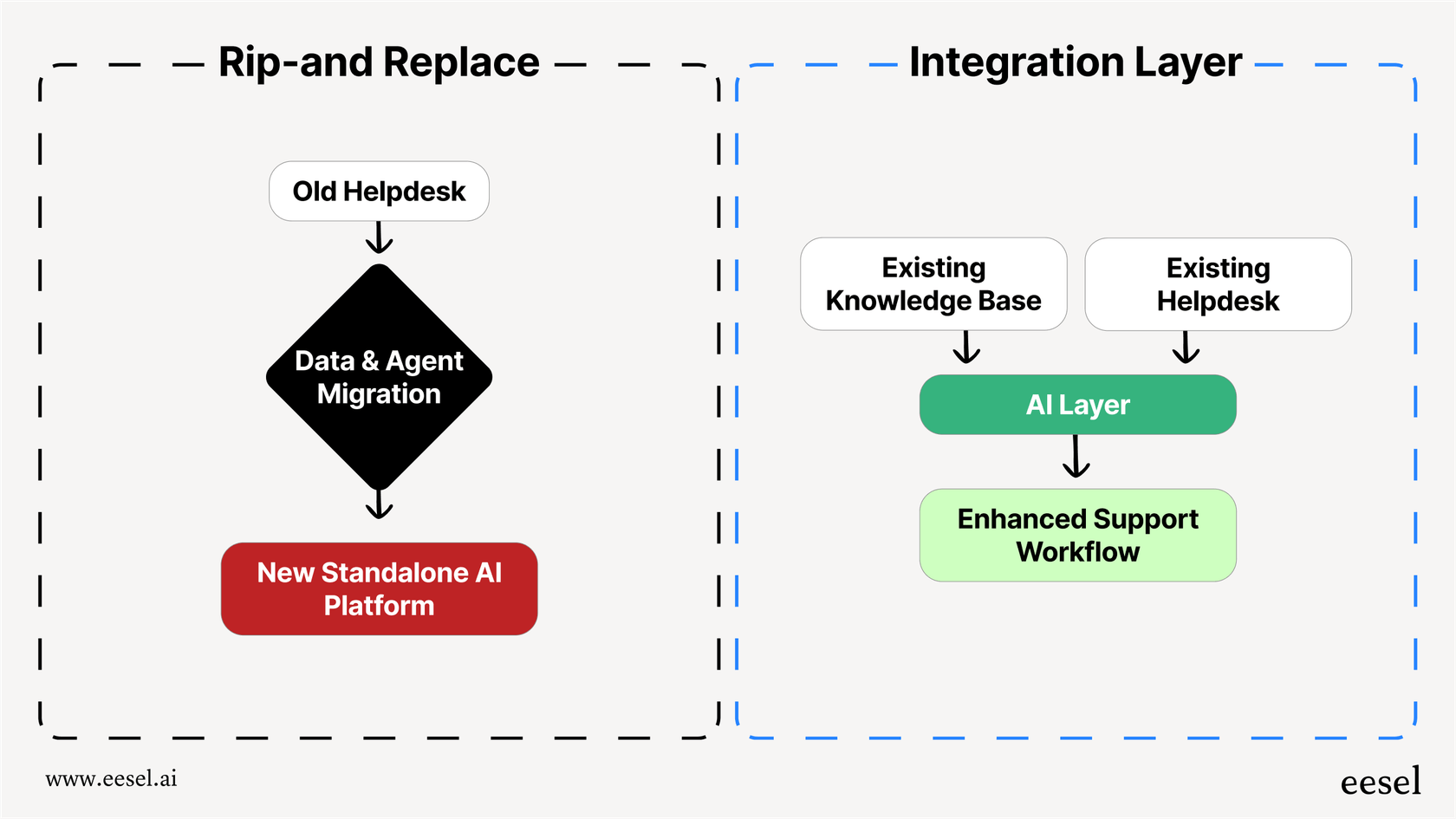
How we picked the best Sierra alternatives
To put together a list that’s actually useful, we didn't just pull names out of a hat. We set up some clear guidelines to find tools that solve the real problems businesses have when looking at platforms like Sierra.
Here’s what we looked for:
-
Plays nice with other tools: Does it connect smoothly with your helpdesk, like Zendesk or Freshdesk, your knowledge base, like Confluence, and your chat apps? Or does it lock you into its own little world?
-
Easy to use and manage: Is it built for the people who will actually use it, like support managers and ops teams? Or do you need a team of developers just to get it running?
-
Gets you results quickly: How fast can you go from signing up to actually seeing a difference? The best platforms get you going in weeks, not months, and let you test things out in a sandbox to see the value before you go all in.
-
Clear pricing: Is the pricing model straightforward and predictable as you grow? Or is it buried in confusing enterprise contracts that leave you wondering what you'll actually pay?
-
A complete toolbox: Does it give you an all-in-one solution for agent assistance, ticket sorting, chatbots, and internal help? Or does it only fix one small piece of the puzzle?
Sierra alternatives at a glance
This table gives you a quick rundown of how our top picks compare.
| Features | eesel AI | Sierra | Kore.ai | Cognigy | Synthflow |
|---|---|---|---|---|---|
| Best For | Teams wanting to boost their current helpdesk | Teams building generative AI projects from scratch | Large companies with in-house developer teams | Global businesses that need complex localization | Companies focused on automating voice calls |
| Helpdesk Integration | Yes (Layered on top) | No (Standalone) | Limited (Custom builds) | Limited (Custom builds) | No (Voice-first) |
| Pricing Model | Transparent, interaction-based | Custom enterprise contract | Custom quote | Custom enterprise license | Transparent, per-minute |
| Ideal User | Support Ops, IT Managers | Innovation Teams, Developers | Developers, Engineers | Developers, Global Ops | Sales & Service Ops |
| Setup Speed | Weeks | Months | Months | Months | Weeks |
The 4 best Sierra alternatives for 2025
Let's get into the details of each platform.
1. eesel AI
eesel AI is the smartest way to bring AI into your customer service setup without having to replace anything. It works like an intelligent brain that connects to all your company's knowledge, no matter where it's stored. It learns from your specific data, like past support tickets, macros, and documents in places like Confluence, Google Docs, or Notion, to provide accurate, relevant answers that are unique to your business.
Pros:
-
Connects with over 100 tools you already use, including your helpdesk, wiki, and chat apps.
-
The simulation mode lets you test the AI's accuracy and potential return on investment using your past tickets before you go live.
-
Offers transparent, scalable pricing plans with no hidden costs or surprises.
-
You get a full set of tools in one platform, so you can solve several problems at once.
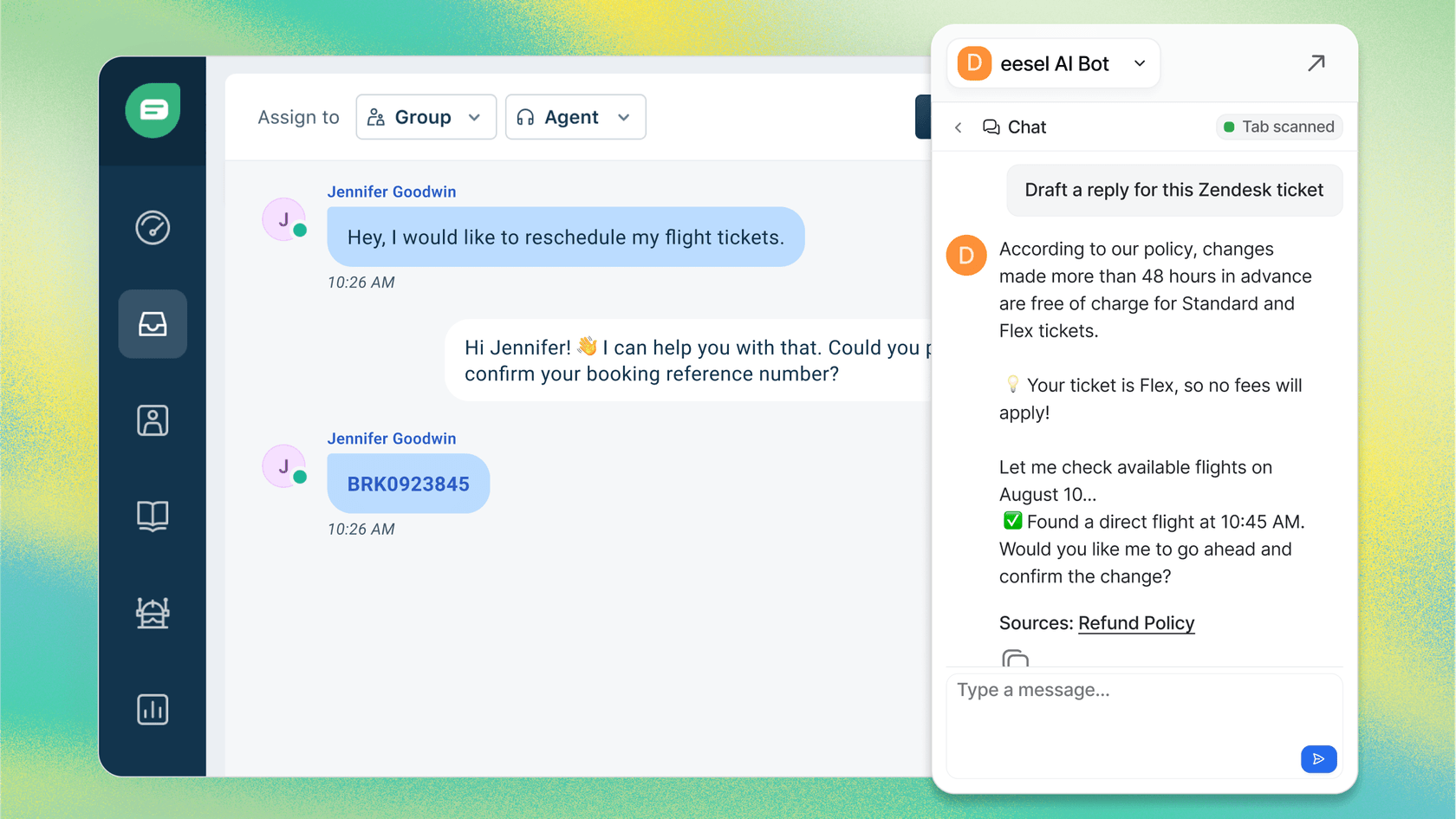
Cons:
- It's fantastic for automating support over chat, email, and web, but it isn't built for creating complex, custom voice systems.
Pricing: eesel AI's pricing is clear and usage-based, starting at $239/month (billed annually) for the Team plan, which covers up to 1,000 AI interactions. It's a welcome change from Sierra's mysterious enterprise contracts.
Use cases: Automating Tier-1 support in Zendesk, giving agents instant reply drafts with an AI Copilot, automatically tagging and routing tickets, and powering an internal Q&A bot in Slack or MS Teams.
2. Kore.ai
Kore.ai is a heavy-duty platform for big companies that want to build custom AI bots from the ground up. It’s a solid option for businesses with strong technical teams that want total control over their bot's behavior and have the resources to handle a complicated project.
Pros:
-
Great for building complex, multi-step bots for industries like banking or insurance.
-
Works across a lot of channels, including voice, web, and social media.
-
Provides detailed analytics and monitoring tools.
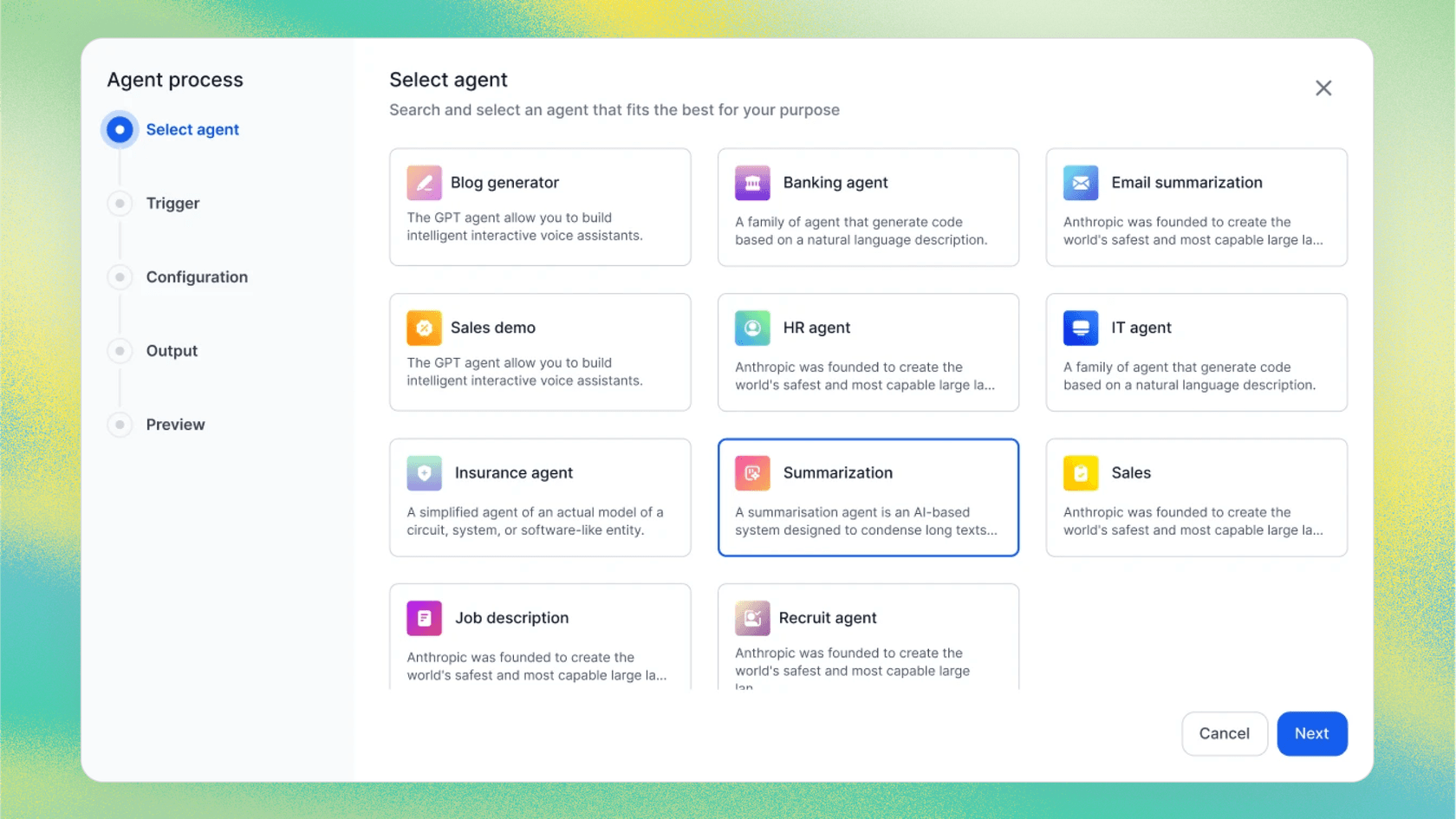
Cons:
-
You’ll need a good amount of developer and engineering help to get it running and keep it going.
-
It’s tough for non-technical users to get the hang of, so it’s not a great fit for most support ops teams.
-
It takes a lot longer to see results compared to platforms that focus on integration.
Pricing: You’ll need to ask for a custom quote based on how much you plan to use it and which features you need.
Use cases: Building a smart banking assistant that can manage account questions and transactions, or creating a detailed insurance claims bot that walks users through a tricky submission process.
3. Cognigy
Cognigy is another AI platform aimed at large enterprises. It's known for strong security, compliance features, and its ability to handle multiple languages, making it a possible choice for big, global companies, especially those in regulated fields.
Pros:
-
A good fit for multinational companies that need one AI solution for different languages and regions.
-
It’s flexible enough for developers who need to build in custom logic.
-
Has a solid reputation in regulated industries like finance and aviation.
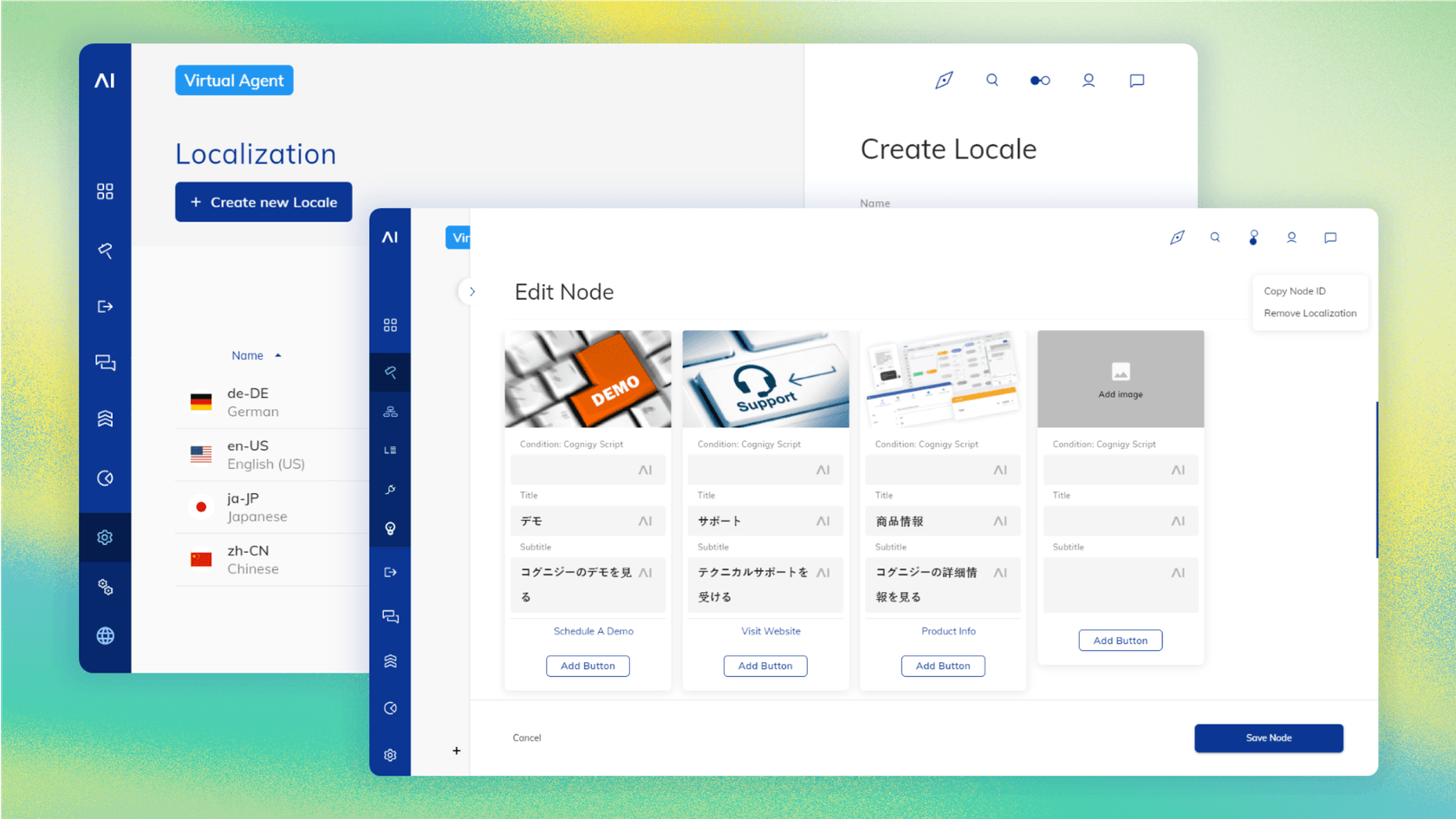
Cons:
-
Getting started often involves a costly and slow "rip-and-replace" project.
-
The interface doesn't feel as modern or user-friendly as some of the newer tools.
-
Most setups require a third-party partner to help with implementation, which adds to the cost and complexity.
Pricing: Cognigy offers a custom enterprise license, so you'll have to get in touch with their sales team for a quote.
Use cases: Rolling out a single AI solution across support centers in different countries to keep branding consistent and follow local rules.
4. Synthflow
Synthflow stands out as a Sierra alternative that’s all about creating human-like AI voice agents for phone calls. It's a platform designed specifically for businesses where the phone is the main way they connect with customers for sales and support.
Pros:
-
The voices sound incredibly natural, with very little delay, so conversations don't have those awkward pauses.
-
The per-minute pricing is transparent and easy to figure out.
-
You can get it up and running quickly for voice-related tasks.
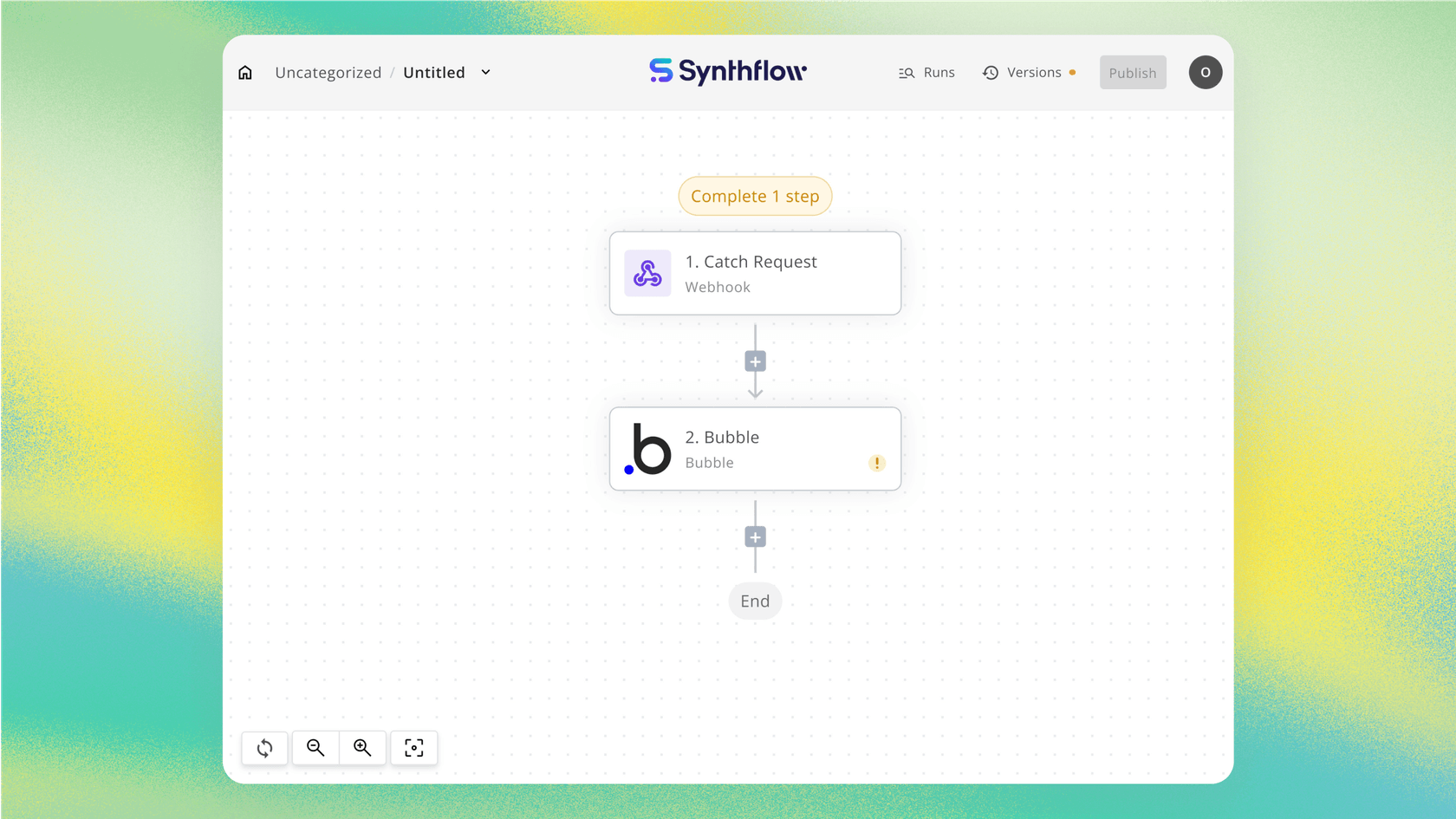
Cons:
-
It’s a voice tool first and foremost. It doesn't have the built-in connections to helpdesks and knowledge bases needed for complete, text-based support.
-
If you need support across multiple channels, Synthflow will only solve one part of your problem.
Pricing: Synthflow's pricing is very competitive, starting at just $0.08 per minute.
Use cases: Automating appointment scheduling over the phone, qualifying incoming sales calls before sending them to a human, and making outbound reminder or follow-up calls.
How to choose between the best Sierra alternatives
Feeling a bit lost with all the options? Here are a few practical tips to help you decide:
-
Improve what you have, don't replace it. Unless you have a really good reason to start over, try to avoid long and expensive migration projects. Pick a tool that makes your current systems even better.
-
Try before you buy. Being able to test an AI on your real historical data is a must. Look for platforms that offer a simulation mode so you can see the value for yourself before you commit.
-
Look at the real price tag. Don't just focus on the subscription fee. Think about the costs of implementation, needing developers, and ongoing upkeep. Transparent, usage-based pricing is usually easier to predict and more cost-effective.
-
Make sure it learns from your brain. The most helpful AI is one that's trained on your company's unique knowledge. Check that the platform can learn from past conversations, internal wikis, and private documents.
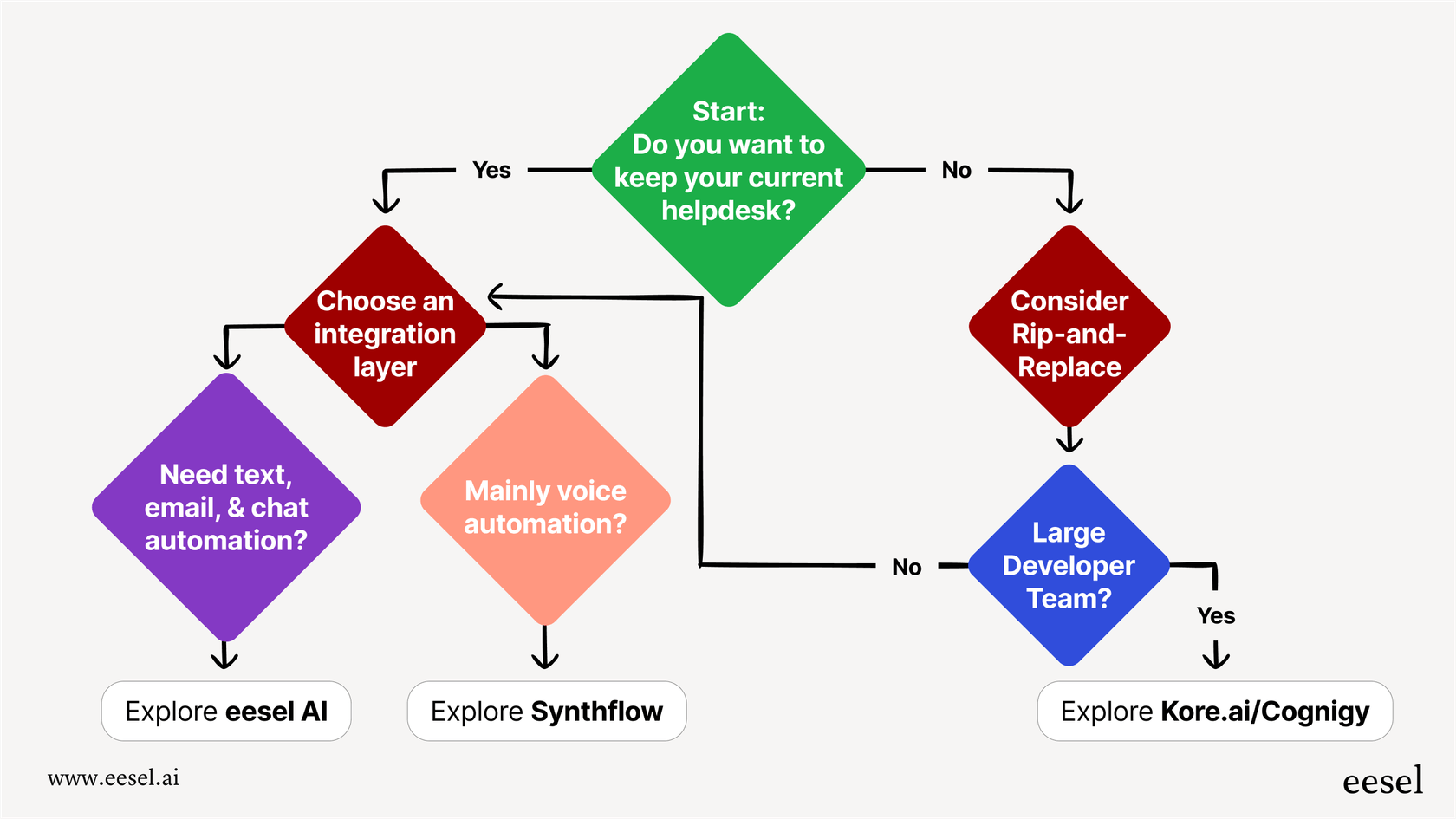
The best Sierra alternatives work with your team, not against it
While Sierra is a new and interesting option, its "all-or-nothing" style isn't practical for most businesses. The conversational AI field has grown up, and today’s best tools are more flexible, connected, and budget-friendly.
The right choice is a platform that respects the tech you already have, uses your team's unique knowledge, and delivers clear results without making you go through a massive migration. It should feel like a powerful new teammate, not a whole new system you have to learn from the beginning.
eesel AI was built on this very idea. It adds powerful, easy-to-use AI on top of the tools your team already uses every day. If you want to see how you can automate up to 70% of your support requests without blowing up your current workflow, you can book a demo to learn more or start your free trial today.
Frequently asked questions
Sierra focuses more on AI-native support, while Zendesk is a traditional platform adding AI later. If you want automation from the ground up, alternatives such as eesel AI offer a leaner, faster setup—while others offer broader tools but more complexity.
Unlike other tools, eesel AI can be great for small teams that want fast AI-driven responses without complex setup. Whereas, Cognigy and Sierra are geared towards enterprise level along with its pricing.
Focus on the total cost of ownership, not just the subscription fee. Look for platforms with transparent, usage-based pricing and consider implementation costs and whether you'll need dedicated developer resources to maintain the system.
The best options for non-technical users are platforms with no-code or low-code interfaces. Tools like eesel AI are designed for support managers to build, test, and deploy AI automations without writing a single line of code.
Yes, the market is specialized. For example, Synthflow is a leading alternative focused entirely on providing human-like AI voice agents for phone calls, while others concentrate on integrating with helpdesks for email and web chat support.
Share this post

Article by
Stevia Putri
Stevia Putri is a marketing generalist at eesel AI, where she helps turn powerful AI tools into stories that resonate. She’s driven by curiosity, clarity, and the human side of technology.




